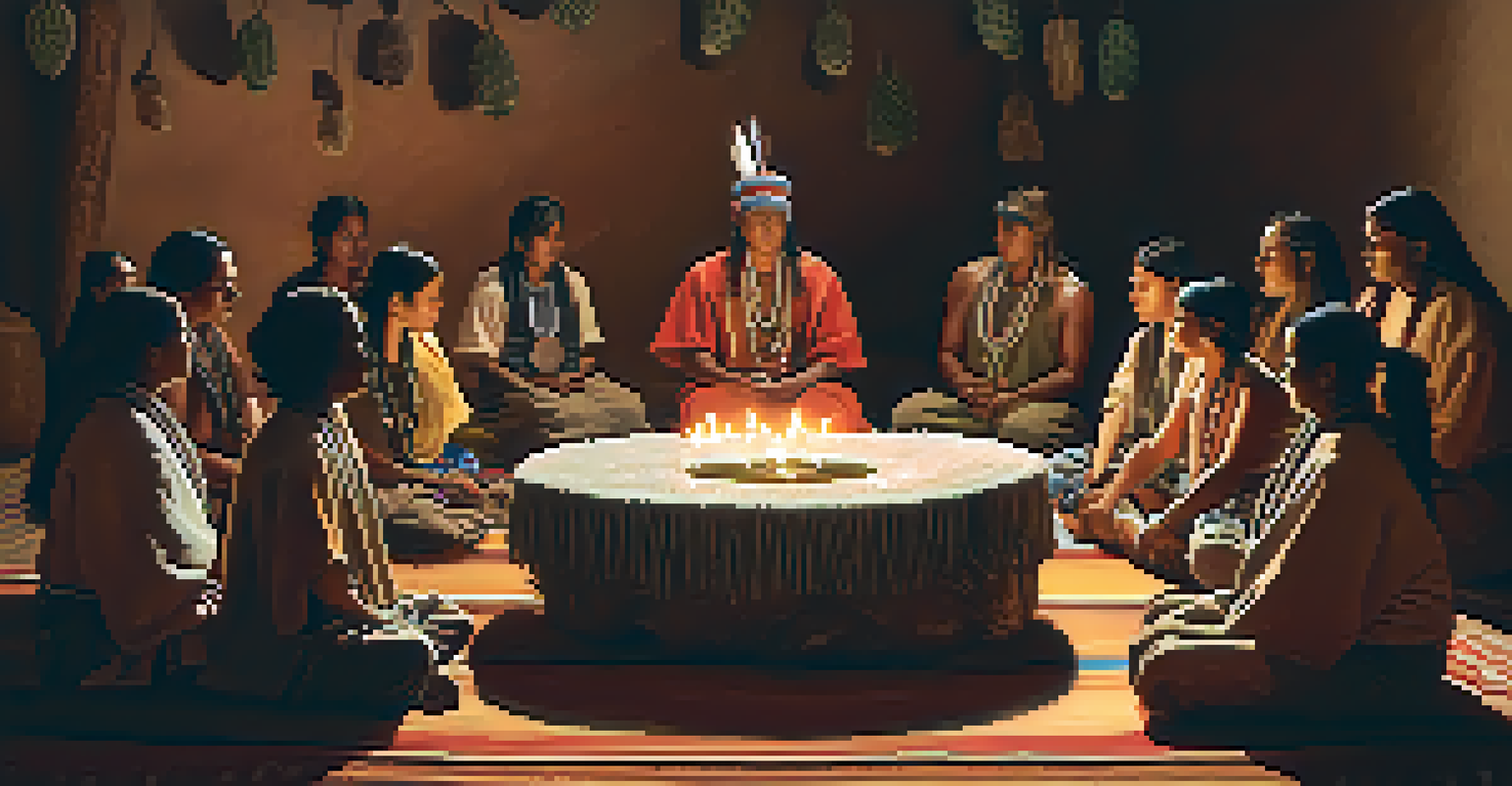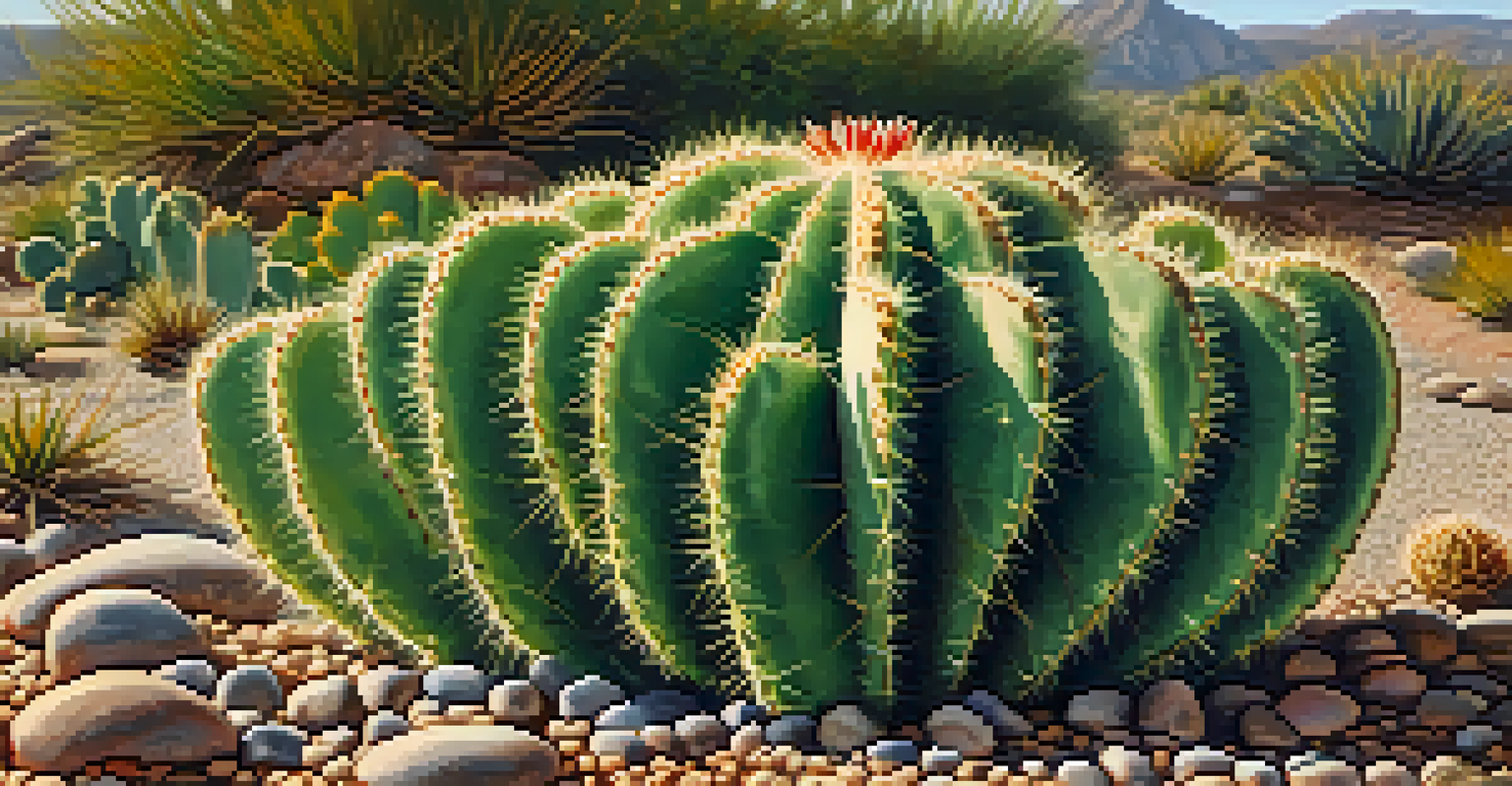Peyote and Spirituality: Ethics in Indigenous Practices

Understanding Peyote: A Sacred Cactus in Indigenous Culture
Peyote, a small, spineless cactus native to Mexico and the southwestern United States, holds profound significance in various Indigenous spiritual practices. For many Native American tribes, this cactus is not just a plant; it is a sacred tool for connection to the divine, used in rituals and ceremonies. Its psychoactive properties have been revered for centuries, allowing individuals to explore consciousness and deepen their spiritual experiences.
The use of peyote is not just about personal exploration; it's about understanding its sacredness and the cultural context it comes from.
The use of peyote is often tied to the concept of healing—both physical and spiritual. Indigenous peoples believe that consumption of peyote can lead to visions and insights that foster personal growth and community well-being. This practice is steeped in tradition, passed down through generations, reflecting the deep respect Indigenous cultures have for nature and the spiritual realm.
However, it’s essential to recognize that the significance of peyote is deeply intertwined with the identity and heritage of Indigenous communities. This connection raises important questions about cultural appropriation and the ethical considerations surrounding the use of peyote by non-Indigenous individuals.
Cultural Appropriation: Respect vs. Exploitation
Cultural appropriation occurs when elements of one culture are taken and used by individuals from another, often without understanding or respect for their original context. In the case of peyote, this can manifest when non-Indigenous people seek to use it for personal spiritual journeys without acknowledging its sacredness to Indigenous tribes. This raises ethical dilemmas about who gets to access and utilize these cultural elements.

Many Indigenous leaders emphasize the importance of understanding the roots of peyote use, which are deeply embedded in their spiritual and cultural practices. The risk of exploitation is real; when peyote is commodified or used outside its intended sacred context, it can diminish its meaning and significance. This highlights the necessity for mutual respect and understanding between cultures.
Peyote's Sacred Role in Culture
Peyote is a sacred cactus central to Indigenous spiritual practices, serving as a tool for healing and connection to the divine.
Engaging with Indigenous spirituality requires sensitivity and awareness. Those interested in peyote must strive to educate themselves about its cultural significance and seek permission from Indigenous practitioners when appropriate, fostering a dialogue grounded in respect and authenticity.
The Role of Ritual in Peyote Use
Rituals surrounding peyote consumption are integral to the spiritual experience. These ceremonies often involve communal gatherings where participants engage in prayer, song, and storytelling, creating a sacred space for reflection and connection. The structure of these rituals helps to guide participants through their experiences, ensuring that the use of peyote is approached with reverence and intention.
Cultural appropriation occurs when we take from others without understanding their history or significance.
In many Indigenous cultures, rituals also serve as a means of education, imparting wisdom and teachings about the natural world and the interconnectedness of all beings. This aspect of ritual is crucial, as it helps individuals understand not just the effects of peyote, but also its place within a broader spiritual framework. Through these practices, participants can find healing and clarity, reinforcing their sense of identity and purpose.
Thus, rituals are not merely an add-on to peyote use; they are a vital framework that shapes the entire experience. By participating in these rituals, individuals honor the traditions of Indigenous peoples and foster a deeper connection to the spiritual realm.
Legal and Ethical Considerations Around Peyote
The legal status of peyote in the U.S. and Mexico reflects ongoing tensions between Indigenous rights and governmental regulations. In the United States, the American Indian Religious Freedom Act allows for the use of peyote in religious ceremonies, but access is often restricted to recognized tribes. This legal framework recognizes the sacredness of peyote, yet it can also complicate its use and accessibility for those outside these communities.
Ethically, the situation becomes complex when considering non-Indigenous individuals who wish to engage with peyote for personal spiritual growth. While the desire to explore spirituality is valid, it must be balanced with respect for Indigenous rights and traditions. Engaging with peyote outside of its cultural context can perpetuate historical injustices and undermine the significance it holds for Indigenous peoples.
Respecting Indigenous Perspectives
Engaging with peyote requires a deep respect for Indigenous voices and traditions to avoid cultural appropriation and exploitation.
Navigating these legal and ethical waters requires a commitment to understanding and respecting the cultural context of peyote use. By prioritizing Indigenous voices and perspectives, individuals can engage in more ethical practices surrounding peyote consumption.
The Importance of Indigenous Voices in Peyote Discussions
Indigenous voices are crucial in discussions surrounding peyote and its ethical use. These communities have lived experiences that shape their perspectives on spirituality, healing, and the cultural significance of peyote. By amplifying Indigenous voices, we can foster a more nuanced understanding of the complexities involved in peyote use and its implications for both Indigenous and non-Indigenous individuals.
Listening to Indigenous leaders and practitioners helps to highlight the importance of consent and respect in spiritual practices. When non-Indigenous individuals seek to engage with peyote, it is vital that they do so with an awareness of the history and struggles faced by Indigenous communities. This approach not only honors these traditions but also promotes healing and reconciliation.
Ultimately, engaging with Indigenous voices can lead to a richer, more authentic spiritual experience for everyone involved. By prioritizing these perspectives, we foster a greater sense of community, respect, and understanding across cultural lines.
Peyote in Modern Context: Challenges and Opportunities
As interest in peyote grows, particularly in wellness and spiritual circles, it presents both challenges and opportunities. The increasing demand for peyote can lead to overharvesting, threatening its survival in the wild. This ecological concern emphasizes the need for sustainable practices and respect for the natural environment, aligning with Indigenous philosophies that emphasize stewardship of the land.
On the other hand, the growing interest in peyote can also create opportunities for education and awareness about Indigenous cultures and their practices. By fostering respectful dialogue and collaboration, non-Indigenous individuals can help support Indigenous communities and their rights to practice their traditions freely. This can also contribute to a broader understanding of the importance of preserving cultural heritage.
Navigating Legal and Ethical Issues
The use of peyote is complicated by legal restrictions and ethical considerations, particularly for non-Indigenous individuals seeking spiritual experiences.
Navigating this modern context requires a balance between curiosity and respect. By approaching peyote with care and consideration, we can honor its sacredness while supporting Indigenous communities and the environment.
Conclusion: A Call for Respectful Engagement with Peyote
In conclusion, engaging with peyote and its spiritual significance calls for a deep sense of respect and understanding. By recognizing the ethical dimensions of its use, we can foster a dialogue that honors Indigenous traditions and the sacredness of peyote. This journey is not just about personal exploration; it is also about acknowledging the shared histories and responsibilities we all hold.
As we navigate this complex terrain, let us commit to being informed and respectful participants in discussions about peyote. This means listening to Indigenous voices, understanding the cultural implications, and approaching the use of peyote with intention and care. By doing so, we contribute to a more ethical and equitable discourse surrounding Indigenous spiritual practices.

Ultimately, the goal of engaging with peyote should be to promote healing, connection, and understanding—both for ourselves and in relation to Indigenous communities. Together, we can create a space where spirituality transcends boundaries and fosters mutual respect.